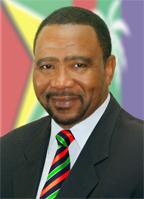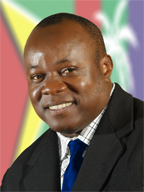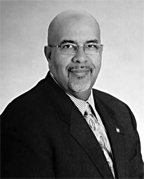The announcement late in July that Robert Corbin, Winston Murray, Aubrey Norton, Aubrey Armstrong and Richard Van West Charles had all been nominated to contest the leadership of the People’s National Congress Reform at the forthcoming 16th Biennial Congress on 21-22 August came as no surprise. Dissatisfaction with Robert Corbin’s leadership of the party has been building up for years and a challenge was expected. In a sense, however, the PNCR’s leadership crisis is nothing new. It has been simmering for more than twenty years and the person who could have averted it was Forbes Burnham’s widow, Viola.

Unlike the six, strong-willed South Asian women Prime Ministers – Bangladesh’s Khaleda Zia and Sheik Hasina; India’s Indira Gandhi; Pakistan’s Benazir Bhutto; and Sri Lanka’s Sirimavo Bandaranaike and Chandrika Kumaratunga – and Guyana’s own Janet Jagan, all of whose assumption of office was the direct result of the deaths of their husbands or fathers, Viola Burnham missed the opportunity presented when Forbes Burnham – both President of the Republic and founding leader of the People’s National Congress – died on 6th August 1985. A mere fortnight later, the scheduled 6th Biennial Congress convened and the leadership has been contested ever since.
For Viola Burnham, the shock of her husband’s death at the relatively young age of 62 years, the overwhelming sympathy which party members felt for her and her own substantial support in the party’s women’s arm – the Women’s Revolutionary Socialist Movement – would have guaranteed her unapposed and unanimous election as his successor in the party. Under the national Constitution, Prime Minister Desmond Hoyte was bound to succeed to the presidency but the party leadership was another matter.

It was Dr Ptolemy Reid – former Prime Minister, party general secretary and Hoyte’s patron – who stepped in to broker an arrangement under which the principle that one person should be both presidential candidate and party leader was accepted. The Congress elected Hoyte as party leader and Viola Burnham was handed a powerless government appointment. To no one’s surprise, as the grief generated by her husband’s death drained away, she was progressively sidelined, leading to her resignation in frustration in 1991.
Hoyte’s survival plan was to purge every prominent party official he regarded as a ‘Burnhamite.’ At the same time, he installed his own supporters and, in the process, deepened the differences which always existed in the party but which a more astute Forbes Burnham prevented from degenerating into antagonisms. The earliest evidence of internal insurgency against Hoyte’s ascendancy came from the ambitious Hamilton Green who Hoyte was obliged to appoint as Prime Minister during the seven remaining years of the PNC administration from 1985 to 1992 and who tried to assume leadership of the Burnhamites. Green openly challenged Hoyte for the party leadership at the 9th Biennial Congress in 1991. Reid, again, was called in to broker a compromise which resulted in the withdrawal of Green’s candidature.

Once the party was thrown out of office in 1992, however, the gloves came off and any pretence at party solidarity, much less personal cordiality, disappeared completely. Green’s supporters attempted to impeach Hoyte for a breach of the party constitution but the move backfired. One step ahead of the party’s ‘Disciplinary Committee,’ Green led his discontents into his own party – eventually named the Good and Green Guyana – the main achievement of which was winning a narrow majority in the Georgetown municipal elections in August 1994.
Hoyte, as leader, dismantled much of the organizational infrastructure which his predecessor had carefully erected over the previous thirty years. If he thought that his own reputation as a reformer and his stature as a statesman would dazzle the masses, he was mistaken. The public was unimpressed and, to no one’s surprise but his own, Hoyte became a serial loser of elections. Defeat triggered fresh palace revolts by a group of younger executives – including Vincent Alexander, Ivor Alleyne, Deborah Backer, Aubrey Norton and Raphael Trotman and others – in an effort to elect a leader capable of saving the party from yet another electoral rout in the forthcoming 2001 general elections.
Despite his poor health, Hoyte was canny enough to outwit the rebels and to cling to the leadership, taking the trouble to ensure that no ambitious rival was ever again designated ‘running mate’ or, much worse, deputy leader. At the same time, he ensured that his most loyal lieutenant Robert Corbin was installed as Chairman – the official who constitutionally assumed leadership in the leader’s absence, incapacity or death. And so it was that, when Hoyte died on 22nd December 2002, Robert Corbin automatically became acting leader. A special delegates’ congress two months later in February 2003 formally elected him party leader. Appearances of solidarity and support were preserved through to the 14th Biennial Congress in August 2004 when Corbin was re-elected unapposed as party leader.
Although there had been a change of leader there was no discernible change of leadership style. Soon enough, the usual rebels started an “Anyone But Corbin” campaign and the insurgencies resumed. The first and most serious was led by Raphael Trotman – a veteran of the anti-Hoyte revolt – who was still a member of the National Assembly. Aware of the futility of mounting a challenge to Corbin in the party’s closed committees, councils and congresses where Corbin held the incumbent’s advantage, he followed the trail blazed by Green a decade earlier, quit the party and established the Alliance for Change.
Corbin seemed to have miscalculated the damage to the image and integrity of his leadership caused by Trotman’s insurgency. As the 2006 general elections approached, the cleft was deepened by the withdrawal of Stanley Ming’s ‘Reform’ wing. One-time allies such as Jerome and Kadim Khan dropped out of sight. It eventually became evident that although prominent PNCR supporters did not openly identify themselves with Trotman and Ming, a significant number of ordinary supporters and voters in the Upper Demerara and Demerara-Mahaica regions did choose to vote for the new Alliance for Change instead of the PNCR.
Corbin also underestimated the damage done to the party’s infrastructure by his predecessor during his 17-year tenure as leader. Many of the urban and rural Guyana Youth and Students Movement and National Congress of Women groups had ceased to exist. The party’s networks in the Barima-Waini, Cuyuni-Mazaruni and Potaro-Siparuni Regions also fell into decay as old supporters left the scene and groundwork among rural and hinterland supporters diminished.
The PNCR, over the years, also neglected to keep in touch with its constituents through visits and dissemination of information, leaving them to the blandishments of rivals. Unlike the PPPC’s Mirror and AFC’s Key newspapers, the PNCR New Nation failed to appear to get its message to its supporters. Facing the electorate for the first time as leader in the 2006 general elections, Robert Corbin watched his party haemorrhage over 51, 000 votes in the electorate and five seats in the National Assembly from its tally in the 2001 general elections.
Defeat usually brings dissent and a fresh insurgency broke out after the rout at the 2006 general elections for which Corbin was blamed. This time it was led by former party vice-chairman Vincent Alexander who mounted a challenge for the leadership at the 15th Biennial Congress in 2007. In the end, the rebels were defeated and the most prominent members of ‘Team Alexander’ – Ivor Allen, Deborah Backer, Hamley Case, Juliana Gaul, Chiyedza James and Peter Livingstone – were reprimanded for breaching party rules by their public display during their campaign to challenge Corbin. Other dissidents simply ignored the tribunal. The harshest treatment was meted out to James McAllister who was recalled from the National Assembly.
In an unrelated incident, Winston Murray resigned the post of Chairman on a matter of principle though he has remained a member of the National Assembly. With the collapse of the Alexandrian conspiracy, the contestants for party leadership have now come down to Armstrong, Corbin, Murray, Norton and Van West Charles.
Delivering his address to the 15th Biennial Congress in July 2007, Corbin suggested that the PNCR would not have progressed in its goal to reform itself if the leadership featured the same faces by its ‘next’ congress. He declared: “It is my own aspiration not only to have the new team of leadership cadres identified by the next congress but to hand over to them while still around to give the necessary support. This cadre of highly trained persons must be committed to the task of taking this party forward, as we retool for the challenges of restoring Guyana to its place of pride and prosperity.” But when the usually well-informed Central Executive Member Amna Ally announced that Corbin “will be contesting the leadership” at the ‘next’ Congress, it was clear that he had every intention of remaining in the position for a long time to come.
As a contender, Central Executive Committee member and former General Secretary and Georgetown District Chairman Aubrey Norton is Corbin’s most recent opponent. Norton lost the election for the district chairmanship to party Vice-Chairman Volda Lawrence at the Georgetown District Conference on 28th June. Lawrence is seen as a Corbinite and, since the Georgetown District will send the largest number of delegates to the 16th Biennial Congress in August, her support will be critical to Corbin’s re-election. Norton made certain allegations in referring to Corbin’s alleged influence in the District elections. That matter is now before the court but the controversy might have damaged Norton’s chances of election to the leadership.
Of the other three nominees to contest the leadership, Winston Murray, the eldest, is most likely to be the first to withdraw from the fray. He declined similar nominations in the past and recently resigned as chairman over the party’s chairmanship over a public departure from a policy position saying that it had becom “impossible” for him to continue to hold the office with credibility. It was assumed, also, that the rationalisation for Murray’s resignation, though genuine, was advanced at a convenient time in order to separate himself from Corbin’s crumbling leadership. He has played a technocratic role and still remains the party’s shadow finance minister in the National Assembly but is unlikely to evince the muscular exertion that a leadership contest demands.
Dr Richard Van West Charles – Forbes Burnham’s son-in-law – landed on the scene last year with the hope of continuing the fight against Corbin by contesting the party’s leadership. Van West Charles had served as Minister of Health during the PNC’s administration and was one of the ‘Burnhamites’ sidelined by Hoyte. He had been working with the Pan-American Health Organization in Washington DC and, as a way of reintroducing himself to the constituents and paving the way for his campaign, he launched the ‘Rebuild Guyana Initiative’ which was supposed to target depressed communities. He attracted a small group of supporters, too small to mount a credible challenge to a seasoned campaigner like Corbin
The strongest contestant for the leadership might be Dr Aubrey Armstrong, an elected member of the Central Executive Committee. His advantages are that he became well known in trade union circles a decade ago as a member of the arbitration tribunal that set public servants’ salaries after the Guyana Public Service Union’s eight-week strike in 1999 and he has been the principal facilitator for several seminars and retreats held over the past six years during Corbin’s tenure. In fact, in preparation for the forthcoming Congress, Armstrong was asked by the Central Executive Committee to undertake wide-ranging consultations with stakeholders in Guyana and overseas on reforming the party. The consultations were part of the follow-up to the strategic leadership retreat which Armstrong facilitated in February this year.
Rumours of a ‘deal’ by which Corbin would somehow facilitate a ‘transfer’ of leadership to Armstrong are implausible and have been denied. A professional management consultant, Armstrong told the Stabroek News earlier this year that, although he has lived overseas for many years, he was confident that the party membership – which ultimately had to make the decision about his candidacy – would recognise that he has always remained involved. He did, however, point out that he is the first Guyanese who has lived abroad for such a long period and has been voted on to the party’s Central Executive Committee, in contrast to other overseas-based executives who have been co-opted. “I feel one good role I can play is as a catalyst, constantly pushing for change,” he declared.
The question for the forthcoming congress is whether, after years of contestation, the PNCR will be able to overcome the chronic leadership crisis that has impaired its work in the National Assembly and injured its standing in the country as a whole. Can that party elect anyone but Corbin?





